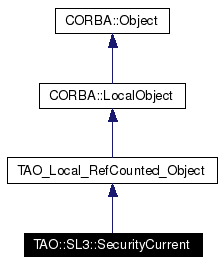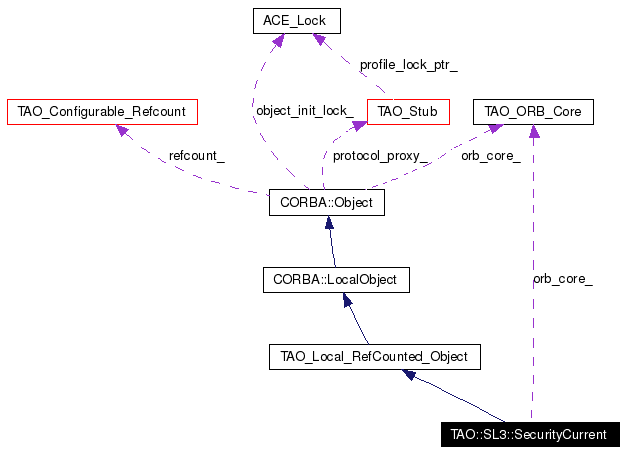
#include <SL3_SecurityCurrent.h>
Inheritance diagram for TAO::SL3::SecurityCurrent:


Public Member Functions | |
| SecurityCurrent (size_t tss_slot, TAO_ORB_Core *oc) | |
| Constructor. | |
| size_t | tss_slot (void) const |
SecurityLevel3::SecurityCurrent Methods | |
Methods required by the SecurityLevel3::SecurityCurrent interface. | |
| virtual SecurityLevel3::ClientCredentials_ptr | client_credentials () |
| virtual CORBA::Boolean | request_is_local (void) |
Protected Member Functions | |
| ~SecurityCurrent (void) | |
| Destructor. | |
Private Member Functions | |
| SecurityCurrent_Impl * | implementation (void) |
Retricted Copying and Assignment | |
Prevent copying through the copy constructor and the assignment operator. | |
| SecurityCurrent (const SecurityCurrent &) | |
| void | operator= (const SecurityCurrent &) |
Private Attributes | |
| const size_t | tss_slot_ |
| Thread-specific storage slot assigned to this object. | |
| TAO_ORB_Core *const | orb_core_ |
Thread-specific information may be retrieved from the target security service through this object.
Definition at line 56 of file SL3_SecurityCurrent.h.
|
||||||||||||
|
Constructor.
|
|
|
Destructor. Protected destructor to enforce proper memory management through the reference counting mechanism. Definition at line 25 of file SL3_SecurityCurrent.cpp.
00026 {
00027 }
|
|
|
|
|
|
Definition at line 30 of file SL3_SecurityCurrent.cpp. References TAO::SL3::SecurityCurrent_Impl::client_credentials(), and implementation().
00031 {
00032 TAO::SL3::SecurityCurrent_Impl * impl = this->implementation ();
00033
00034 // If the implementation pointer returned from TSS is zero, then
00035 // we're not in the middle of a request/upcall. Throw an exception
00036 // to indicate that.
00037 if (impl == 0)
00038 throw CORBA::BAD_INV_ORDER ();
00039
00040 return impl->client_credentials ();
00041 }
|
|
|
The pointer is actually one to a concrete implementation provided by the underlying security mechanism. For example, SSLIOP implements its own SSLIOP-specific operations corresponding to the ones exposed by the SecurityCurrent interface. Similarly, SECIOP would do the same.
Definition at line 17 of file SL3_SecurityCurrent.inl. References TAO_ORB_Core::get_tss_resource(). Referenced by client_credentials(), and request_is_local().
00018 {
00019 TAO::SL3::SecurityCurrent_Impl *impl =
00020 static_cast<TAO::SL3::SecurityCurrent_Impl *> (
00021 this->orb_core_->get_tss_resource (this->tss_slot_));
00022
00023 return impl;
00024 }
|
|
|
|
|
|
Definition at line 44 of file SL3_SecurityCurrent.cpp. References implementation(), and TAO::SL3::SecurityCurrent_Impl::request_is_local().
00045 {
00046 TAO::SL3::SecurityCurrent_Impl * impl = this->implementation ();
00047
00048 // If the implementation pointer returned from TSS is zero, then
00049 // we're not in the middle of a request/upcall. Throw an exception
00050 // to indicate that.
00051 if (impl == 0)
00052 throw CORBA::BAD_INV_ORDER ();
00053
00054 return impl->request_is_local ();
00055 }
|
|
|
The concrete thread-specific storage SecurityCurrent implementations will each use this slot ID. Definition at line 11 of file SL3_SecurityCurrent.inl.
00012 {
00013 return this->tss_slot_;
00014 }
|
|
|
Pointer to the ORB Core corresponding to the ORB with which this object is registered. Reimplemented from CORBA::Object. Definition at line 130 of file SL3_SecurityCurrent.h. |
|
|
Thread-specific storage slot assigned to this object.
Definition at line 126 of file SL3_SecurityCurrent.h. |
 1.3.6
1.3.6